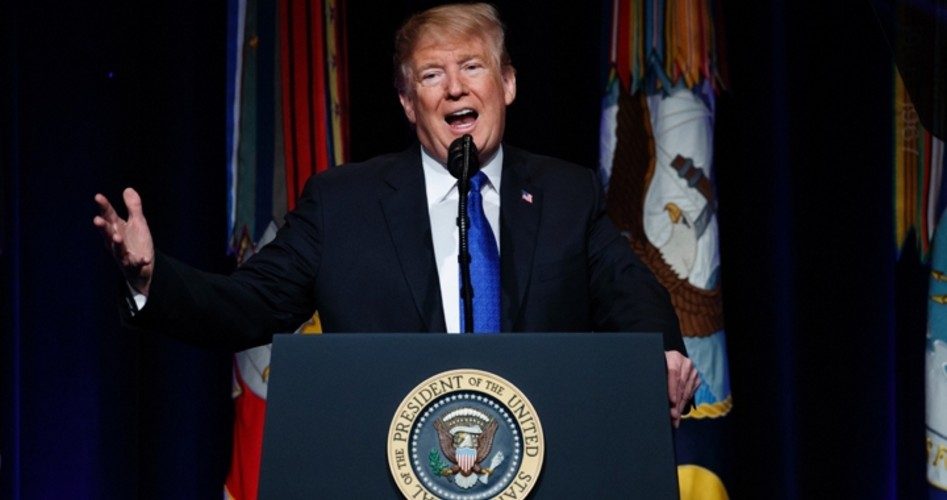
The Atlantic magazine launched the first official establishment impeachment broadside against the president on Thursday. Authored by the magazine’s political editor Yoni Appelbaum, the article charged that the president “has mounted a concerted challenge to the separation of powers, to the rule of law, and to the civil liberties enshrined in our founding documents. He has purposefully inflamed America’s divisions. He has set himself against the American idea, the principle that all of us — of every race, gender, and creed — are created equal.”
One might question Appelbaum’s understanding of those “founding documents,” but at least his magazine is consistent: It hates Donald Trump and wants him removed or so damaged politically that he cannot complete more of his agenda.
Back in 2016 the magazine, for only the third time in its 162-year history, endorsed a candidate (Hillary Clinton) for president. But it wasn’t an endorsement of Clinton so much as a repudiation of Trump:
Donald Trump … has no record of public service and no qualifications for public office. His affect is that of an infomercial huckster; he traffics in conspiracy theories and racist invective; he is appallingly sexist; he is erratic, secretive, and xenophobic; he expresses admiration for authoritarian rulers, and evinces authoritarian tendencies himself. He is easily goaded, a poor quality for someone seeking control of America’s nuclear arsenal. He is an enemy of fact-based discourse; he is ignorant of, and indifferent to, the Constitution; he appears not to read….
Trump is not a man of ideas. He is a demagogue, a xenophobe, a sexist, a know-nothing, and a liar. He is spectacularly unfit for office, and voters … should act in defense of American democracy and elect his opponent.
Since voters failed to heed his counsel, Appelbaum has been biding his time, waiting for the opportunity to try once again to attack, defuse, and derail Donald Trump. In his article, he outlined the five ways to do that. Impeaching the president would “shift the public’s attention to the president’s debilities, tipping the balance of power away from him, skimming off the froth of conspiratorial thinking, moving the fight to a rule-bound forum, and dealing lasting damage to his political prospects.”
{modulepos inner_text_ad}
Appelbaum concludes his broadside with a challenge to Congress:
Today, the United States once more confronts a president who seems to care for only some of the people he represents, who promises his supporters that he can roll back the tide of diversity, who challenges the rule of law, and who regards constitutional rights and liberties as disposable.
Congress must again decide whether the greater risk lies in executing the Constitution as it was written, or in deferring to voters to do what it cannot muster the courage to do itself. The gravest danger facing the country is not a Congress that seeks to measure the president against his oath — it is a president who fails to measure up to that solemn promise.
All of which is just so much applesauce according to Alan Dershowitz, the liberal Harvard Law professor emeritus. He read Applebaum’s broadside and called his reasoning “interesting and challenging” but nevertheless flawed. Appelbaum, according to Dershowitz, “wants us to violate the Constitution as it relates to impeachment,” adding that “we should not violate the Constitution in order to safeguard it.”
Article II, Section 4 of that Constitution spells out the requirements for impeachment: “The President, Vice President, and all civil Officers of the United States, shall be removed from Office on Impeachment for, and Conviction of, Treason, Bribery, or other high Crimes and Misdemeanors.”
It’s the phrase “high crimes and misdemeanors” that House Democrats are likely to use if they decide to impeach President Trump, for it includes perjury of his oath of office, abuse of constitutional authority, bribery, intimidation, misuse of assets, failure to supervise the executive branch, dereliction of duty, conduct unbecoming the presidency, refusal to obey a lawful order, chronic intoxication, and tax evasion.
But they might not, despite the cries for Trump’s scalp by many of the new House members. House Speaker Nancy Pelosi reasonably stated, “If there’s to be grounds for impeachment of President Trump — and I’m not seeking those grounds — that would have to be so clearly bipartisan in terms of acceptance of it before I think we should go down any impeachment path.” Otherwise impeachment would be viewed as a partisan effort to besmirch the president’s reputation as a political liability in the run-up to his reelection efforts next year.
There would certainly be some political advantage if the House ignores Pelosi’s warning, including distracting the president from performing his duties and completing his agenda. But those distractions would likely be remembered by voters come November 2020. Victor Davis Hanson, a historian at the Hoover Institution at Stanford University, made clear the dangers of such a distraction: “When Republicans did that to [President] Clinton, his approval rating went up.… As a reward for the drawn-out drama around the impeachment, Republicans lost seats in both the 1998 and 2000 House elections.”
Those hearings would be a “circus,” according to Hanson, and would likely be remembered in 2020: “Many would prefer Trump’s sometimes over-the-top tweets [instead of] the circus they saw at the Brett Kavanaugh nomination hearings [or] the rantings of Ocasio-Cortez or the endless attempts to remove him from office.”
With the impeachment of the president comes the danger of partisan overreach that would, perversely, virtually ensure his reelection in 2020.
Photo: AP Images
An Ivy League graduate and former investment advisor, Bob is a regular contributor to The New American magazine and blogs frequently at LightFromTheRight.com, primarily on economics and politics. He can be reached at [email protected].



